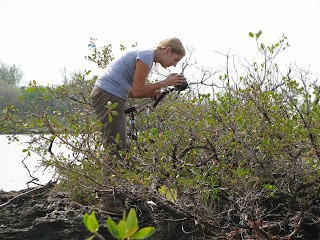For some people, fooling around at work means going on Facebook; for me, it meant chasing after Sergio the stingray. Of course, it will be surreal to wake up and not find Nolan, our resident anole, flashing his dewlap at the horizon. Finally, there are the people. Manuel, Dave, Dustin, and Maria have taught me so much throughout the month: about ecology, different ways to cook plantains, how to drive a boat, but also much more… and they have given me many memories and new knowledge that I will bring back to Connecticut with me. They might need to drag me out of this country on June 13, but as we say here: “Such is life.”
Gracias,
Angie
Working as a field assistant studying the ecological and behavioral effects of the introduction of Leiocephalus carinatus on Anolis sagrei on several cays within Snake Cay in Abaco has been an all-around amazing experience. During my time filming anoles, I have been very fortunate to observe and record several rare events; my favorites of which include a male A. sagrei making several (unsuccessful) foraging attempts on a small berry (“Pobrecito!”), and a successful copulation between a pair of A. sagrei that lasted a solid fourteen minutes before interruption by a jealous male. Angie and I also discovered that L. carinatus may have a preference for pine pink orchids (Bletia purpurea) and have been involved in a side project surrounding this observation.
In addition to the two species of lizards that we have been studying, the area is home to a plethora of plant and animal life that we have been able to enjoy. While filming lizard behavior, we have been visited by many beautiful species of birds, some juvenile reef and nurse sharks, stingrays, and sea turtles. The area itself is serene, both at our field sites and near our house. I have enjoyed every minute of being here.
Thank you, Chipojo team 2011, for making this an unforgettable opportunity.
My internship in the Bahamas was one of the better experiences of my life. The best part about it was the fieldwork. You definitely can’t beat observing herps for hours on end, and getting paid for it on top of that. Manuel and Dave were quick to answer any questions I had about the local animals (mostly herps), and there were a lot of them. I was able to learn many fascinating things about the local fauna and even see many of them first hand, which is just not something you get to do in the classroom. We were also shown and educated on the local culture, which was very different and interesting for me as I have never been to the Caribbean before. If I had to pick one thing about it I was not satisfied with (aside from drowning my camera) it would have to be the time. I have a feeling there is so much more to learn and experience, as well as other cool projects to work on, and you just can’t do it all in 30 days. I am very thankful for this opportunity, and feel that it helped me greatly on my road to becoming a future biologist. This experience was definitely one that I will never forget.



No comments:
Post a Comment